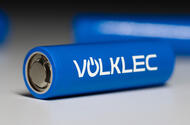Volklec’s cylindrical cells will be built under license from Chinese firm Far East Battery
Coventry-based Volklec aims to supply cells for the âunderservedâ market with help from China
British battery start-up Volklec will begin producing cells in Coventry later this year.
It has licensed two lithium ion designs from Chinese firm Far East Battery, each measuring 21mm in diameter and 70mm in length.
The first to enter production will be a cell for e-bikes and suchlike, using nickel-manganese-cobalt (NMC) chemistry, followed by a new and more powerful unit aimed at automotive and aerospace companies.
The intent, according to executive director Phil Popham, is to produce batteries for âunderservedâ firms, such as Britain’s vast network of niche sports car makers.
âWeâre not looking at attracting the volume OEMs or volume customers,â said the former Lotus CEO.
Both the cells will be manufactured at the UK Battery Industrialisation Centre (UKBIC), a development hub backed by the semi-governmental Advanced Propulsion Centre, the University of Warwick and the West Midlandsâ local authorities.Â
Volklec will initially build some 0.1GWh worth of batteries at the UKBIC annually. Once Far East Battery has readied its more powerful cell design, it will look to add another 1GWh production line at the site, dedicated to the newer cell.Â
The company has already received help from Far East Battery experts, drafted in from China to help it navigate the hurdles involved with getting a new factory running.
âTheir manufacturing and process engineers will be with us and will stay with us until we get up to the levels of yield and quality that they get in China,â said Popham.
Popham expects demand from the âunderservedâ market to outstrip the prospective 1.1GWh supply, saying:Â âThe market is already bigger than that, and that’s only going to grow in the future.”
Volklec plans to eventually build its own battery factory in the UK, which could yield as much as 10GWh. This would put it on a par with the new Envision AESC development at the Nissan factory in Sunderland.
Popham suggested it could become even larger: âWe anticipate that’s going to be 10GWh, but it could be different to that because the market is going to grow, and it’s going to grow significantly.â
Volklec could also produce batteries of its own design, or even those from another manufacturer, because it isn’t locked into an exclusive deal with Far East Battery.
Nonetheless, Popham urged caution, citing a âpragmaticâ approach to growing the business. He explained: âI saw some of the attempts that have failed in the UK and thought: âwhat model will actually work?â It was clear that a more pragmatic approach was required, a derisk approach.Â
âWhat I mean by derisk is getting to market quicker and having modest investments, rather than massive investment over a long period of time [before beginning production].
“That led us to include that we needed partnerships in there â manufacturing partnerships and technical partnerships. And that’s what we’ve been working on.â
Popham said this approach âgives confidence to investorsâ, hinting at the sour mood felt by many after the 2024 collapse of UK battery start-up Britishvolt.
He explained: âThe initial energy cell production is already funded by the founders, so we will be going out with a funding round to support the unique line for the power cell.
“Obviously we will need external funding when we springboard into our own factory, but with that, progressive proof of delivery is appropriate as well for raising investment.â
He also cited the benefit of the collaboration with Far East Battery: âWe get economies of scale because we’ve got their access to their economies of scale. From day one, we’ll be buying material through them, and as we ramp up production, then we will embark upon a localisation program, localising in the UK/Europe.
“We will do that for the cell that has been produced already. We will have that in production by the end of the year.
âThe agreement also allows us to import cells from [Far East Battery] as well, identical cells, so we can get them into customers now for testing, engineering programs or for use in end products immediately â and we can supplement that volume as we ramp up our own production, if customers need more cells.
âWe will repeat that whole process again with the [more powerful] cell in a yearâs time.â
Source: Autocar
